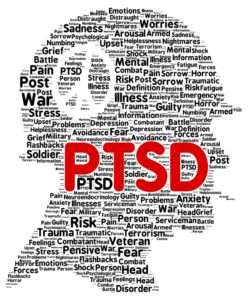Let’s Talk About PTSD!
[AdSense-A]
 By Doctor Eugene Eisman, MD FACP
By Doctor Eugene Eisman, MD FACP
Today I am going to discuss post traumatic stress disease. That’s a lot of words, and from now on I will call it PTSD. It wasn’t always called PTSD. I believe that in the First World War it was Shell Shock, and in World War II was called Battle Fatigue. This disease has a remarkable history. It has been called many things, but was first recognized thousands of years ago.
About 20 years ago I read a remarkable book written by Jonathan Shay, Achilles in Vietnam. You may of heard about the first author who wrote about PTSD. His name was Homer (?Last name, first name?). It was written before there was printing, and the story of The Iliad was handed down, word of mouth, and committed to memory. It was first committed to printing about 650 BC.
Having done my stint in Vietnam, and seen much pain, I can appreciate the destruction caused by PTSD alone. I served as a physician, six months in Pleiku and six months in Cam Ranh. I was there in 1969 – 70 and things had quieted down. I had little fear for my own safety, but sixty years later, I still have flashes where I remember the Vietnamese soldier with his eyeballs, blown out of the sockets, hanging on his cheeks, still connected by the optic nerves. The combatants had the awful experience of seeing their brothers in arms dying, or having arms and legs blown off. It may surprise you to learn that the major victims of PTSD were nurses. In Vietnam they worked eighteen hours a day. No breaks! They witnessed the terrible damage by warfare. Every minute was consumed by taking care of mangled soldiers, and they often held them while they slowly died. The average nurse, in Vietnam, never recovered and carried these memories her entire life.
So, let us return to Achilles in Vietnam. The setting takes place a couple of thousand years ago near a city called Troy. The Achaeans (Greece had not been invented yet) are arguing about their awards for bravery in combat. I know, today he would get a Bronze Star, or the Medal of Honor. They did not award medals 2000 years ago. You were awarded one of the women from the other side. Well, the general of the Achaeans had to give his woman back. She was the daughter of a Trojan priest, and the gods were punishing the Achaeans for taking the daughter of a priest. The general’s solution was to give back the woman, and take for himself Achilles award.
Shay points out in his book that PTSD is often triggered by loss of confidence in the commander. The thought that a successful mission is imperative regardless to the loss of life, is horrifying to the ordinary soldier. In this case, Achilles, who is an offspring of a human and goddess, is still human enough to feel that the general should go fuck himself. Not only is he going back to his tent, and mope, as captain, he will keep his soldiers out of the fight, and this is the beginning of Achilles’ PTSD.
Well, you all know the story; his comrade in arms, Patroclus takes Achilles armament and goes off to lead the troops. Patroclus is killed by Hector, and the PTSD rages in Achilles. Back to Vietnam; your buddy is walking point, and is killed. What is your response? “Boy, am I lucky, I could have been walking point.” No, that is not the typical response. The “lucky soldier” feels, “I killed my friend. I should have been walking point. It would be better if I was killed, and he was still alive.” So, what does Achilles do? The enemy is no longer soldiers that should have some respect for fighting for what they believe in, they are vermin. Achilles takes no prisoners. Those that surrender to him are cut down without mercy.
PTSD does not remit after the war. Women find their husbands reconnoitering the back yard to make sure there are no threats. Wives find that they must sleep in another bed, or risk being killed by their husband during his usual nightly nightmare. Divorce is often attributed to the husband’s PTSD.
I have had several patients who have survived the war, but have recurrent panic attacks. They cannot hold down a job. They see psychiatrists and psychologists with only partial relief of their symptoms. Surprisingly marijuana seems to be better than Xanax etc. Marijuana is a class one drug, so there are many hoops to jump before prescribing it.

